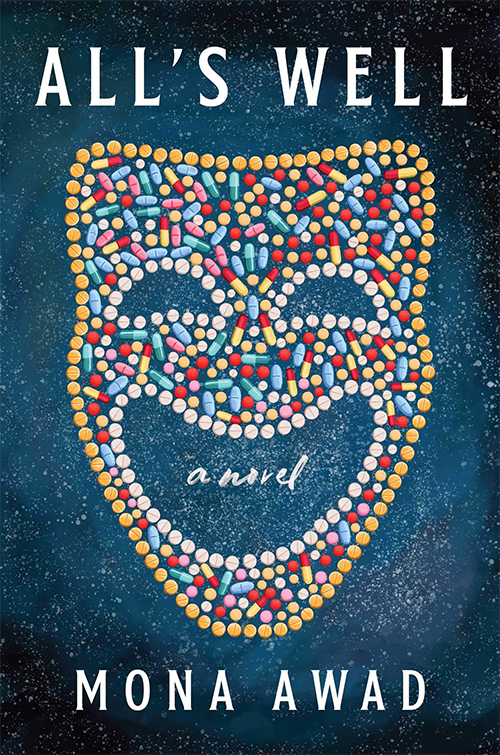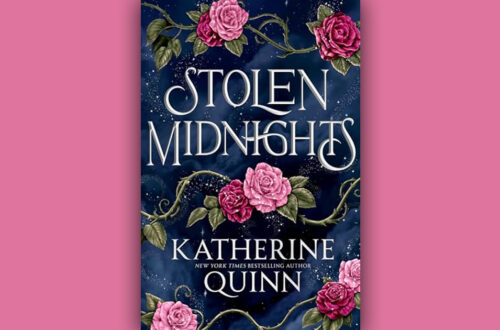All’s Well by Mona Awad is a contemporary horror-comedy with a dash of magical realism. It features Miranda Fitch, a college theater professor with debilitating chronic pain, who spends just as much time managing her pain as she does convincing people it’s real. In charge of directing the annual Shakespeare production at her college, she’s decided to produce All’s Well That Ends Well, in spite of a cast of mutinous students who want to put on Macbeth instead. It seems they might have their way and this, too, will be taken from her, until she drowns her sorrows at a bar where she meets three mysterious men and makes a Faustian bargain that appears to change the tides in her favor.

This is a problem play… Neither a tragedy nor a comedy, something in between. Something far more interesting.
Mona Awad, All’s Well
While All’s Well is readable and enjoyable on its own, I would suggest quickly perusing a summary of William Shakespeare’s All’s Well That Ends Well in order to enjoy some of the more subtle nuances in this novel. Scholars classify Shakespeare’s play as a “problem play” because it features several problematic themes and generally unpleasant characters. Furthermore, while it contains a formulaic “happy ending” like all his comedies, it is far from satisfying.
Awad masterfully adapts and subverts key moments from All’s Well That Ends Well. A particular favorite of mine is how she treats the bed trick: Shakespeare uses it to prove that in the dark, all women are alike to men. He also gives women that knowledge, which allows them to wield it like a weapon when necessary. In All’s Well, Miranda consistently confuses or imagines her new beau as though he were her ex-husband, and it similarly turns into an exercise to help her get what she wants. It’s not good or nice, but who said power or control was supposed to be either?
Miranda’s experiences with pain also highlight important social commentary about health care professionals doubting women know their own bodies and pain levels. However, because Miranda is so unlikeable, it’s difficult to feel sympathy for her plight. And that is the problem: Miranda has been managing her pain for so long that it is a part of her personality now. Of course she’s unpleasant when no one ever believes she’s in pain, doctors fail to help her, and people and systems appear to collude against her well-being. But I worry that the novel features so many other wild, twisted elements that this critical issue will be easy to forget for those who doubt or question its validity. That certainly proves Awad’s point, but selective ignorance does nothing to help move the conversation forward for real people.
I need to perform my little bit of pain for you so you’ll know I’m human? … A few pretty tears on my cheeks that you can brush away. Just a delicate little bit of ouch so you know there’s someone in there. So you don’t get too scared of me, am I right?” So you know I’m still a vulnerable thing. That I can be brought down if need be.
Mona Awad, All’s Well
As readers barrel towards the conclusion, the novel takes on a sublime, almost Shakespearean quality (rather appropriately). Unexpected magic twists plots beyond recognition and reverses fates without warning. Miranda seems to find easy solutions for some of her biggest problems, but they haunt her to the point of madness at certain points. It’s challenging to keep up with everything, and not even Awad’s engaging voice could stop me from wishing for an intermission. I was somehow both bored and overwhelmed a little over halfway through the novel because I was ready for the climax. The novel felt overwritten while Miranda was at the peak of her madness, and the denouement didn’t give me what I wanted. As much as I enjoyed the beginning of this book, I was confused and unsatisfied by the end. It seems lazy to argue that was by design, given All’s Well That Ends Well is a problem play. I shouldn’t be left feeling as though someone ripped out the last 20 pages of the book!
All’s Well is a creative, macabre romp unlike anything you’ve read before. At times readers are left feeling unmoored and a little anxious as they doubt whether they want to go where the plot will lead. They’ll question who they’re supposed to be rooting for, and if all can ever actually be well for Miranda. But that’s part of the fun: Awad takes Shakespeare’s problem play…and plays with the problems.
Thank you to NetGalley and Simon & Schuster for sharing an advanced reader copy of this book in exchange for an honest review.
All’s Well at a glance
Book details
Title: All’s Well
Author: Mona Awad
Publisher: Simon & Schuster
Release Date: August 3, 2021
Page Count: 352
Synopsis
From the author of Bunny, which Margaret Atwood hails as “genius,” comes a “wild, and exhilarating” (Lauren Groff) novel about a theater professor who is convinced staging Shakespeare’s most maligned play will remedy all that ails her—but at what cost?
Miranda Fitch’s life is a waking nightmare. The accident that ended her burgeoning acting career left her with excruciating chronic back pain, a failed marriage, and a deepening dependence on painkillers. And now, she’s on the verge of losing her job as a college theater director. Determined to put on Shakespeare’s All’s Well That Ends Well, the play that promised and cost her everything, she faces a mutinous cast hellbent on staging Macbeth instead. Miranda sees her chance at redemption slip through her fingers.
That’s when she meets three strange benefactors who have an eerie knowledge of Miranda’s past and a tantalizing promise for her future: one where the show goes on, her rebellious students get what’s coming to them, and the invisible doubted pain that’s kept her from the spotlight is made known.
With prose Margaret Atwood has described as “no punches pulled, no hilarities dodged…genius,” Mona Awad has concocted her most potent, subversive novel yet. All’s Well is a “fabulous novel” (Mary Karr) about a woman at her breaking point and a formidable, piercingly funny indictment of our collective refusal to witness and believe female pain.



